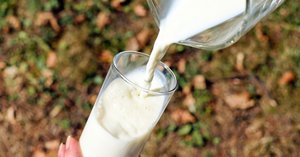A study published in the International Journal of Epidemiology found that women who consume cows’ milk may increase their risk of breast cancer by up to 80%.The study was commissioned by the National Cancer Institute, National Institutes of Health, and the World Cancer Research Fund.The observational study examined 52,795 North American women over nearly 8 years to see if those who consumed cows’ milk or soy milk were more at risk for breast cancer. PixabayThe participants filled out a detailed food questionnaire before beginning and many were taken from “Adventist Health Study-2, as many Adventists follow a vegetarian diet and tend to consume significant amounts of soy in comparison to the Standard American Diet,” stated Center for Nutrition Studies.At the end of the 7.9 years, 1057 participants had developed breast cancer.The women who only consumed soy milk or no milk at all didn’t show an increase in individual risk. However, women who drank one eight ounce glass of milk a day increased their risk by 50%, and those who consumed two to three glasses increased their risk by a staggering 80%.
PixabayThe participants filled out a detailed food questionnaire before beginning and many were taken from “Adventist Health Study-2, as many Adventists follow a vegetarian diet and tend to consume significant amounts of soy in comparison to the Standard American Diet,” stated Center for Nutrition Studies.At the end of the 7.9 years, 1057 participants had developed breast cancer.The women who only consumed soy milk or no milk at all didn’t show an increase in individual risk. However, women who drank one eight ounce glass of milk a day increased their risk by 50%, and those who consumed two to three glasses increased their risk by a staggering 80%. PixabayOne of the authors of the study, Gary E. Fraser, MBChB, PhD, said the study gives “fairly strong evidence that either dairy milk or some other factor closely related to drinking dairy milk is a cause of breast cancer in women.”He went on to say, “Consuming as little as 1/4 to 1/3 cup of dairy milk per day was associated with an increased risk of breast cancer of 30%. By drinking up to one cup per day, the associated risk went up to 50%, and for those drinking two to three cups per day, the risk increased further to 70% to 80%.”
PixabayOne of the authors of the study, Gary E. Fraser, MBChB, PhD, said the study gives “fairly strong evidence that either dairy milk or some other factor closely related to drinking dairy milk is a cause of breast cancer in women.”He went on to say, “Consuming as little as 1/4 to 1/3 cup of dairy milk per day was associated with an increased risk of breast cancer of 30%. By drinking up to one cup per day, the associated risk went up to 50%, and for those drinking two to three cups per day, the risk increased further to 70% to 80%.” PixabayAll women have an inherent 12% average risk of breast cancer and while drinking a glass of cow’s milk doesn’t guarantee a woman is 50% more likely to get cancer, it does increase her individual risk, according to the study.Researchers have been conducting more studies on dairy products to see if their speculation that the reproductive hormones in the milk cause an increased risk for specific cancers.
PixabayAll women have an inherent 12% average risk of breast cancer and while drinking a glass of cow’s milk doesn’t guarantee a woman is 50% more likely to get cancer, it does increase her individual risk, according to the study.Researchers have been conducting more studies on dairy products to see if their speculation that the reproductive hormones in the milk cause an increased risk for specific cancers. PixabayCurrent U.S. Dietary Guidelines recommends adults consume three glasses a day of fat-free milk, but the study found “full fat and reduced fat milks produced similar results.”“Dairy milk does have some positive nutritional qualities,” Fraser said, “but these need to be balanced against other possible, less helpful effects. This work suggests the urgent need for further research.”Source
PixabayCurrent U.S. Dietary Guidelines recommends adults consume three glasses a day of fat-free milk, but the study found “full fat and reduced fat milks produced similar results.”“Dairy milk does have some positive nutritional qualities,” Fraser said, “but these need to be balanced against other possible, less helpful effects. This work suggests the urgent need for further research.”Source








